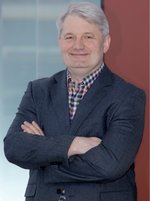
Dear Readers,
The past year, in which we celebrated the ten-year anniversary of our merged University of Duisburg-Essen (UDE), was also a particularly successful year for research. Once again we were able to raise our volume of third-party funding against the previous year’s level. It is especially the individual achievements of the researchers at the UDE that make our research so successful, with each and every one of them contributing in their own significant way to the research performance of the University as a whole.
On a national level particular successes in the past year include the Research Training Groups, Research Units and Collaborative Research Centres newly approved or extended by the German Research Foundation (DFG) and the support and funding of the Federal Ministry of Education and Research (BMBF) for junior researchers.
In 2013 the UDE secured two new DFG Research Training Groups: GRK 1919 “Precaution, prevision, prediction: managing contingency” of the Historical Institute (Speaker: Prof. Stefan Brakensiek) was approved, as was GRK 1949 “Immune Response in Infectious Diseases – Regulation between Innate and Adaptive Immunity” (Speaker: Prof. Jörg Timm) in the Faculty of Medicine. The DFG also approved the second funding phase of Research Training Group GRK 1613 “Risk and East Asia”. The Speaker in the first funding period was Prof. Karen Shire, with Prof. Flemming Christiansen assuming the role in the second phase.
The BMBF-funded “IN-EAST School of Advanced Studies” was launched with six groups of researchers at postdoc level. The Scientific Coordinator is Prof. Markus Taube. The School looks at innovation in East Asia from various perspectives. The BMBF Junior Research Group within the NanoMatFutur programme has also got underway with Dr. Philipp Wagener’s project “INNOKAT – Integration and application of ligand-free and controlled ligand-functionalized nanoparticles in catalysis”.
The DFG approved the new Collaborative Research Centre SFB 1093 “Supramolecular Chemistry on Proteins” (Speaker Prof. Thomas Schrader) in the Faculty of Chemistry. A further successful application was for extension of the Sino-German Collaborative Research Centre SFB TRR 60 “Mutual interaction of chronic viruses with cells of the immune system: from fundamental research to immunotherapy and vaccination”. Here the UDE, with the Speaker Prof. Ulf Dittmer of the Faculty of Medicine, is cooperating with universities in Bochum, Shanghai and Wuhan. After drawing to a close at the end of 2013, the successful research of Priority Programme SPP 1267 “Sphingolipids – Signal and Disease”, coordinated by the Speaker Prof. Erich Gulbins of the Faculty of Medicine, is set to continue as part of the newly approved Research Unit 2123 “Sphingolipid dynamics in infection control” in collaboration with colleagues from Würzburg.
DFG Research Unit FOR 1993 “Multi-functional conversion of chemical species and energy” marked another success, in this case for the engineers on the Duisburg campus. Its Speaker is Prof. Burak Atakan. Approval was also given in 2013 to DFG Priority Programme SPP 1748, “Reliable Simulation Techniques in Solid Mechanics. Development of Non-standard Discretisation Methods, Mechanical and Mathematical Analysis”, submitted by the UDE’s Vice-Rector for Research.
A further success in 2013 was achieved with allocation of the third group in the NRW Returning Scientists Programme of the Ministry of Innovation, Science and Research (MIWF). As part of the programme to encourage highly qualified young researchers to return to Germany, with effect from 1 April 2014 Dr. Dominik Boos is setting up a new group in genetics at the Centre for Medical Biotechnology.
In terms of EU funding, everything is in place for the Framework Programme for Research and Innovation, HORIZON 2020. Here we aim to continue the developments of the past years. In the concluding evaluation on participation in the 7th EU Framework Programme, the University of Duisburg-Essen was ranked third nationwide, representing a 145 percent improvement on the 6th Framework Programme.
2014 has also got off to a promising start for the UDE. Prof. Christof Schulz is the joint recipient of the most important German research award, the Gottlieb Wilhelm Leibniz Prize, together with Prof. Andreas Dreizler from TU Darmstadt University. Dr. Gabi Schierning, who already leads a junior research group at the UDE, is to receive the NRW Science Ministry’s Innovation Award in the “Junior Researchers” category.
Ties with our two neighbouring universities in the Ruhr region, Ruhr University Bochum and TU Dortmund University, meanwhile continue to grow within the University Alliance Ruhr
(UA Ruhr). An important step in this direction was made in 2013 with the establishment of a UA Ruhr Research Council, which will prepare joint strategic decisions in the coming years.
The objective is to build on existing cooperation and develop new projects. In the years ahead, we intend to enforce our potential within the Ruhr region as an international location for science and research.
I wish you an informative and inspiring read.
Yours,
Prof. Dr.-Ing. Jörg Schröder
Vice-Rector for Research, Junior Academic Staff & Knowledge Transfer

